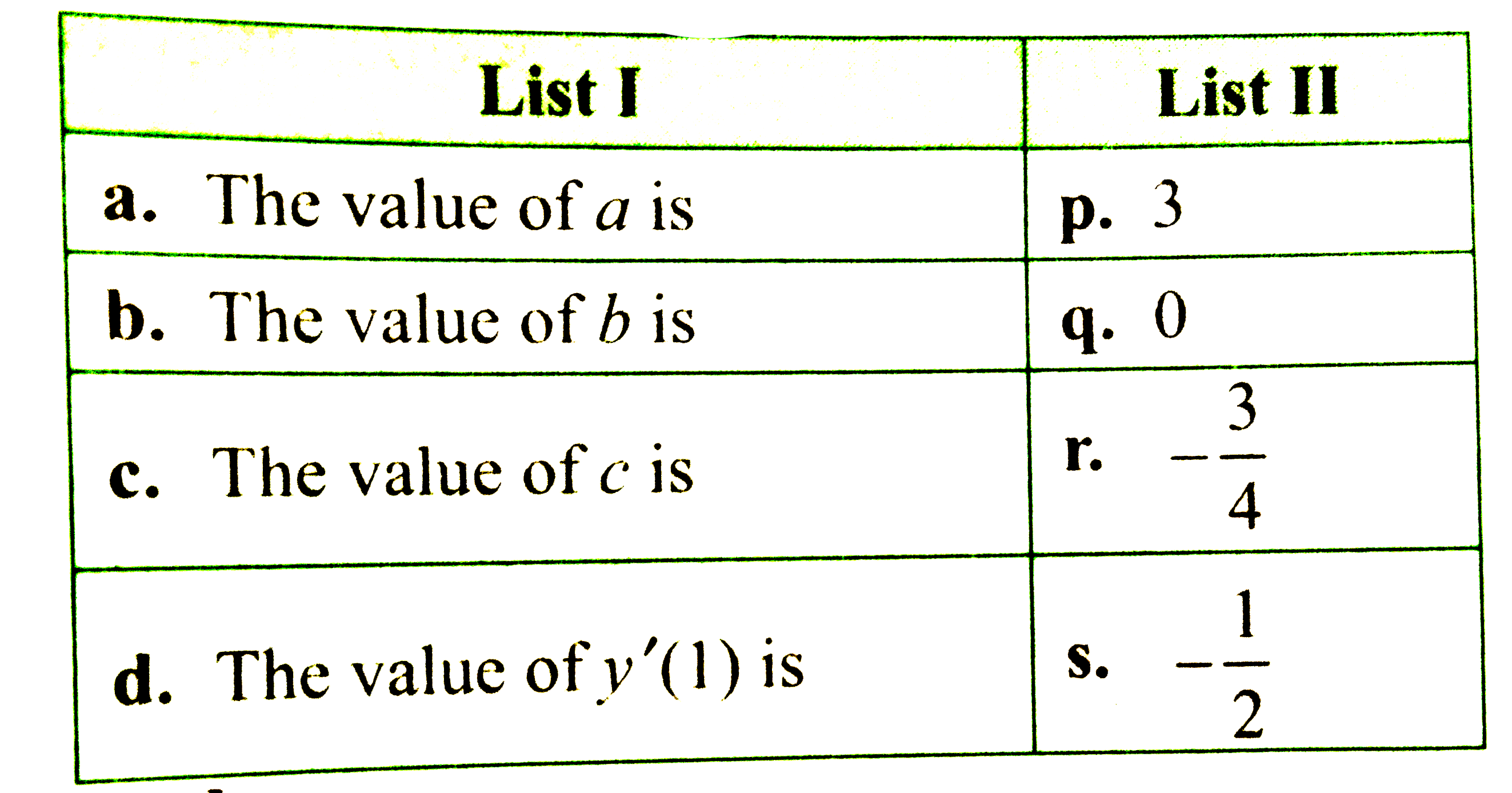The curve y=ax3+bx2+cx+5 touches the x-axis at P(−2,0) and cuts the y-axis at the point Q where its gradient is 3. Find the equation of the curve completely.
To find the equation of the curve y=ax3+bx2+cx+5 that touches the x-axis at the point P(−2,0) and cuts the y-axis at the point Q where its gradient is 3, we will follow these steps:
Step 1: Use the point P(−2,0)
Since the curve touches the x-axis at P(−2,0), we can substitute x=−2 and y=0 into the equation of the curve:
0=a(−2)3+b(−2)2+c(−2)+5
This simplifies to:
0=−8a+4b−2c+5
Rearranging gives us our first equation:
8a−4b+2c−5=0(Equation 1)
Step 2: Find the gradient at point P
The gradient of the curve is given by the derivative:
dydx=3ax2+2bx+c
At the point P(−2,0), the gradient must be 0 (since it touches the x-axis):
0=3a(−2)2+2b(−2)+c
This simplifies to:
0=12a−4b+c
Rearranging gives us our second equation:
12a−4b+c=0(Equation 2)
Step 3: Find the gradient at the y-axis
The curve cuts the y-axis at Q(0,5). The gradient at this point is given as 3:
3=3a(0)2+2b(0)+c
This simplifies to:
c=3(Equation 3)
Step 4: Substitute c into Equations 1 and 2
Substituting c=3 into Equation 1:
8a−4b+2(3)−5=0
This simplifies to:
8a−4b+6−5=0⟹8a−4b+1=0(Equation 4)
Now substituting c=3 into Equation 2:
12a−4b+3=0(Equation 5)
Step 5: Solve Equations 4 and 5
From Equation 4:
8a−4b=−1⟹2a−b=−14(Equation 6)
From Equation 5:
12a−4b=−3⟹3a−b=−34(Equation 7)
Step 6: Solve Equations 6 and 7 simultaneously
Subtract Equation 6 from Equation 7:
(3a−b)−(2a−b)=−34+14
This simplifies to:
a=−12
Step 7: Substitute a back to find b
Substituting a=−12 into Equation 6:
2(−12)−b=−14
This simplifies to:
−1−b=−14⟹b=−1+14=−34
Final Step: Write the equation of the curve
Now we have a=−12, b=−34, and c=3. Thus, the equation of the curve is:
y=−12x3−34x2+3x+5
Summary of the solution:
The complete equation of the curve is:
y=−12x3−34x2+3x+5
Since the curve touches the x-axis at P(−2,0), we can substitute x=−2 and y=0 into the equation of the curve:
0=a(−2)3+b(−2)2+c(−2)+5
This simplifies to:
0=−8a+4b−2c+5
Rearranging gives us our first equation:
8a−4b+2c−5=0(Equation 1)
The gradient of the curve is given by the derivative:
dydx=3ax2+2bx+c
At the point P(−2,0), the gradient must be 0 (since it touches the x-axis):
0=3a(−2)2+2b(−2)+c
This simplifies to:
0=12a−4b+c
Rearranging gives us our second equation:
12a−4b+c=0(Equation 2)
The curve cuts the y-axis at Q(0,5). The gradient at this point is given as 3:
3=3a(0)2+2b(0)+c
This simplifies to:
c=3(Equation 3)
Substituting c=3 into Equation 1:
8a−4b+2(3)−5=0
This simplifies to:
8a−4b+6−5=0⟹8a−4b+1=0(Equation 4)
12a−4b+3=0(Equation 5)
From Equation 4:
8a−4b=−1⟹2a−b=−14(Equation 6)
12a−4b=−3⟹3a−b=−34(Equation 7)
Subtract Equation 6 from Equation 7:
(3a−b)−(2a−b)=−34+14
This simplifies to:
a=−12
Substituting a=−12 into Equation 6:
2(−12)−b=−14
This simplifies to:
−1−b=−14⟹b=−1+14=−34
Now we have a=−12, b=−34, and c=3. Thus, the equation of the curve is:
y=−12x3−34x2+3x+5
The complete equation of the curve is:
y=−12x3−34x2+3x+5
Topper's Solved these Questions
Similar Questions
The curve y=ax2+bx2+cx+5 touches the x-axis at P(−2,0) and cuts the y-axis at point Q, where its gradient is 3. Now, match the following lists and then choose the correct code.

View SolutionIf the curve y=ax3+bx2+cx is inclined at 45∘ to x-axis at (0, 0) but touches x-axis at (1, 0) , then
View SolutionThe curve x=4−3y−y2 cuts the y-axis into two points P and Q. then the area enclosed by the y-axis and the portion of the curve which lies between P and Q is
View SolutionThe curve y=ax3+bx2+cx is inclined at 45∘ to x-axis at (0,0) but it touches x-axis at (1,0) , then a+b+c+10 is
View SolutionThe equation of tangent to the curve y=be−x/a at the point where it crosses Y-axis is
View SolutionWrite the equation of the tangent to the curve y=x2−x+2 at the point where it crosses the y-axis.
View SolutionThe tangent at any point (x,y) of a curve makes an angle tan−1(2x+3y) with x-axis. Find the equation of the curve if it passes through (1,2).
View SolutionFind the equation of the tangent to the curve y=x−7(x−2)(x−3) at the point where it cuts the x-axis.
View SolutionShow that the line xa+yb=1 touches the curve y=be−xa at the point where it crosses the y-axis.
View SolutionShow that the line xa+yb=1 touches the curve y=be−xa at the point where it crosses the y-axis.
View Solution
